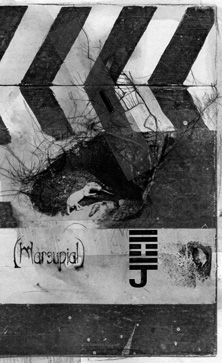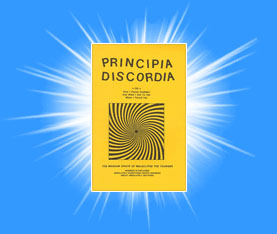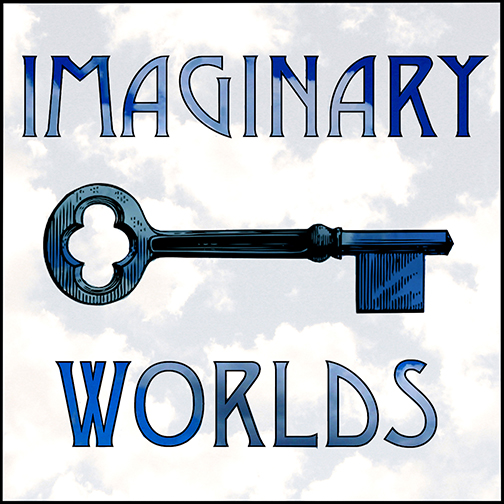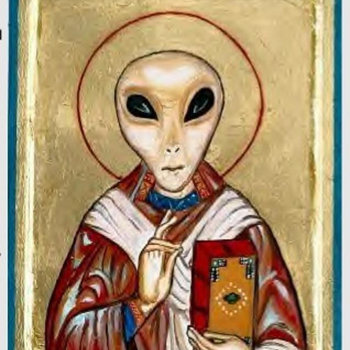
Our Mother for the Time Being
I get a fair amount of stuff in the mail, mostly books and records, which is nice because when I come home from a discouraging day there is usually a little pile of Christmas presents wrapped in brown cardboard at my door. Most of the time, of course, the thrill of anticipation is more pleasurable than the discovery phase. Not so the other day, when I unwrapped the kind gift of Marsupial: Our Mother for the Time Being, the new book-length fiction by Derek White. I recognized the aesthetic of the cover right away. Besides blogging and publishing Sleepingfish, White runs Calamari Press, and having seen and enjoyed a couple of their books, which White designs as well as edits, I recognized his characteristically playful post-punk scribbly graphics vibe right off the bat. Marsupial was wrapped in a black-and-white collage: a clump of hair, photo fragments, a snail thing, and various smears and scratches overlaid a a movie scene clacker whose fat striations were echoed in a détourned I Ching hexagram I instantly recognized as number 61, Chung Fu, Inner Truth—the same oracular glyph that pops up toward the end of Philip K. Dick’s novel The Man in the High Castle.
This is gonna be good, I thought.
And indeed it was. Great, possibly, and even if not Great, then certainly the most delightfully original thing I have read in ages—a twisted and mercurial mind fuck that reaches into your guts and twists them into animal balloons. The meta-novel is more or less told from the perspective of a young Southern boy who shows up in Paris in order to be a stand-in for his brother in a pretentious low-rent Scifi B-movie about junkies addicted to “bug juice.” Slipping in and out of bodies, names, and identities, the narrator is hardly reliable. He may be dreaming; he may be a figment of his brother’s imagination. This instability is mirrored in the episodic structure of the book, as we pass, quick-cut style, back and forth through a number of narrative frames—childhood memoir, dream sequences, dictionary definitions, screenplay, film shoot, forensic documents, erotic fantasies. These are presented in different typefaces and genres of documents, and are interspersed with lots of White’s gnarly and evocative dada-punk collages. The typeface and the tales inevitably bleed into one another, as the film goes meta, an already unstable reality goes kaleidescope, and the typography goes viral—as, for example, the dialogue format of the screenplay begins to colonize and represent the conversation in the “real life” threads.
I won’t try to summarize the plot, which holds together the way that David Lynch holds together (and to about the same degree): on a level of enigmatic images that nomadically stray and repeat with an obsessive psychosexual economy marked with a surreal carnality and the unmistakable insistence of what one can only call “the unconscious.” These images and lacunae include crawfish (a Southerner’s version of Lautremont’s lobster, je suppose), eggs, molting bodies, bellies, mistranslation, missing mothers. White is funnier than Lynch though, and much less of a prude—one of the many things that makes Marsupial way more readable than a lot of experimental fiction is White’s willingness to light-heartedly play with both pervy sex (“Not another Last Tango scene!”) and body horror—the latter of the dripping, yucky, Cronenbergian variety, rather than anything slasher.
Marsupial is a heady ride to be sure, linguistically prickly in a manner that is appropriate for writing that wants to puncture mere fiction. One of the many strokes of genius are the “talky talkies” the French crew use to communicate, and that automatically produce babblefish translations for our American hero. But Marsupial’s puzzle games and reality shifts are grounded in the body, albeit a disorganized, Deleuzian body of sperm, pouches, phallic appendages, mutant DNA, and crusty, flaking scale-skin. Its high brow if you think about it, but also greatly enjoyable. The work of art I kept thinking about was Neutral Milk Hotel’s album In the Aeroplane over the Sea, with its deeply fleshy psychedelia, but that no doubt says more about me than White.
True, the weird frisson does begin to drag in the second half of the 200-page book, and White cannot resist a few excessively arty and self-conscious moves (the footnotes that mount towards the end particularly irked me for some reason). But, in the face of countless fictions that try and fail, Marsupial does achieve a genuinely dream-like logic. Not only is the imagistic and narrative texture recognizably dreamlike, but the text’s perpetual shuttling between words and worlds conjures some of the more elusive qualities of the feverish borderlands between dream and awakening. I was not surprised to read that the snippets in White’s last book, 2006’s Poste Retante, were based on White’s own nocturnal peregrinations.
The best thing I can say about Marsupial is that it gave me an amazing dream. I read the first half in one glorious evening, and then I hit the sack. I have been thinking about dreams a lot lately, and I went to bed with the strong intention of staying conscious as I fell to sleep. My weirdest and most memorable dreams generally occur during this hypnogogic passage into the Dreaming rather than the usual morning recall, and tonight, primed by my hours with White, I found myself stumbling through a series of scrambled dream scenarios that were vivid and largely unpleasant. My dreaming self could not think straight, not unlike White’s narrator, and I felt as if I had taken some bad drug.
Finally I found myself behind the wheel of a car, driving along a freeway with my wife. We were chit-chatting I think. As we hurtled towards a tunnel (stop snickering), I discovered that the brakes didn’t work. I told my wife about this, but she responded with some garbled word salad, a reaction that was so uncharacteristic on her part that I realized I was in a dream. I thought to myself, “Great, I can just fly away or something from this shitty situation.” Then I felt—but did not see—a large claw enclose my right foot, a claw that no doubt belonged to one of the copious crawfish in White’s text. This was deeply creepy, to say the least—I always find strong physical sensations without visual cues in dreams very powerful. A nightmarish panic began, but instead of using my lucid dream control to abandon ship, I had the most curious thought: “Ah, fuck it, why bother flying away? Where is there to go anyway?” And so I just relaxed into the horror, submitting myself to the monster claw and the certain crash. And then I woke.




